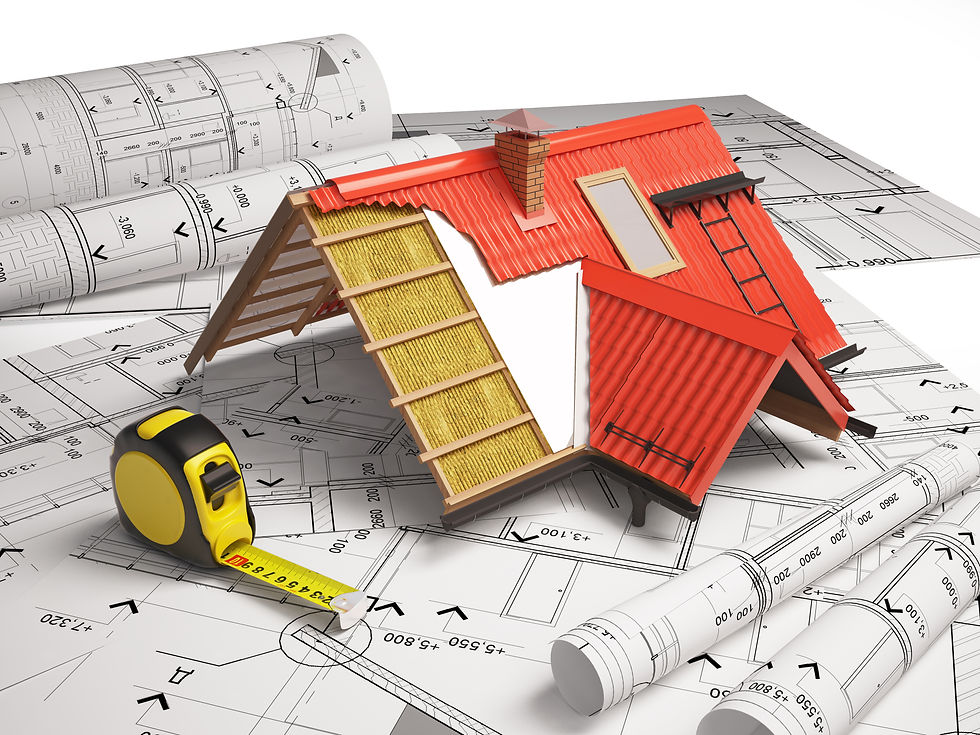Things to Think About When Building a Custom Home
- Murray Moments

- Sep 27, 2022
- 4 min read

For most people, when they think of buying a new home, there is only one option - buy an existing home. This is the path chosen by most buyers. But for some buyers, there is another option and that is to build a custom home. The idea of building your home from the scratch is both thrilling and daunting.
On one hand, there is the excitement of a one-of-a-kind home, with almost all aspects of it made to order. On the other hand, since most custom home project owners are not experienced builders, there is the complexity and uncertainty of overseeing a building construction.
The stakes are higher for people who build a custom home than those who buy a pre-owned home. As RealPropertyGroup.co explains, if a person makes a mistake when buying a prebuilt home, at worst, they get a damaged or overvalued property. But custom home owners may end up with no home at all if they make a mistake.
Before embarking on a custom home build you must understand the work involved. You should assess your resources to see if it is something you can handle. A lot of custom home projects fail because they are undertaken as ego projects; you don’t want that to happen to you.
That being said, a custom home is the way to get the most out of homeownership because you can maximize every dollar you invest in the home. Even though the process may be challenging, in the end, you are assured of a home that will give you the utmost satisfaction.
To get there, follow the tips below.
Important things to know about building a custom home

1. Put the first things first
The first thing when building a custom home is to have the right sequence for the build. That sequence is as follows:
· Determine your budget
Before you take the step to look for a lot where to build the house or an architect to design the home, decide first how much you can afford. Setting budgetary limits to your project is the number one way to safeguard against failure. It offers a firm reference point for measuring decisions.
It creates an objective basis to help you determine which features are necessary and unnecessary. Without a budget, your designer could make extraneous additions to the building that will push the project cost out of your reach.
· Find the right builder

This sounds counterintuitive, but the right builder can help you navigate other critical aspects of the project like the right choice of land, building design, and financing. When looking for a builder, limit your search to builders who have done similar projects in your location in the last 3-5 years.
In addition to their professional qualifications, you should ensure that their work style suits you. Ask your builder for relevant references only and make sure you follow up on those references.
· Design your home and find the lot

Before you buy the land, determine what kind of home you want to build. This is because the lot you choose imposes limits on the structural and aesthetic design of your home. All of the following factors can exert direct or indirect influence on the type of home you can build; plot size, building codes, slope of the land, orientation of land, style of homes in the neighborhood, presence of overhead power lines, groundwater or nearby water bodies, access to utilities, and the availability of amenities.
Once you decide on the details of the home you want, you can buy in a location that will let you do whatever you want on the lot.
· Plan every detail
This is probably going to be the most tedious and boring part of the project. It is not unusual to suffer from decision fatigue when planning a custom home build. But the labor that goes into planning the minute details of the home can save you countless headaches in the future.
More importantly, it will save you money by helping you avoid expensive mistakes. Furthermore, if you take the time to plan the details now, your project will have fewer delays and be more likely to be completed on schedule.
2. Design for your needs and your future
Before you design the home, separate what you WANT the home to have from what you NEED the home to be. Draw inspiration for ways to make your custom home better by looking at what doesn’t work in your current home.
Think of what your life will be like in the next ten years and design the home to accommodate that reality. Also, don’t forget to design the home with the possibility of leasing or selling it in the future.
3. Expect complicated financing

Custom home projects will typically not qualify for a standard mortgage because lenders view them as high-risk. In place of regular mortgage finance, you may have to use a construction loan for the project. These have different qualification requirements and terms than a regular
mortgage. If that option does not work, you can use hard money; an expensive but dependable option.
In conclusion, cover your bases but expect delays and hiccups along the way. Also, remember that the success of your custom home project may ultimately come down to one thing; your builder. Invest time to find a qualified builder. Good luck!
.png)










Comments